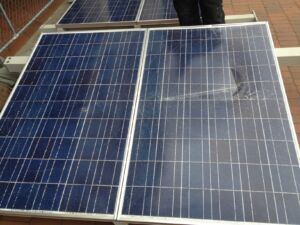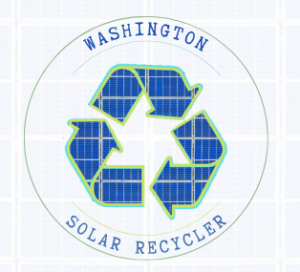QUICK LINKS
Can solar panels be recycled?
Decommissioning solar panels after 30+ years of operation poses unique challenges for an industry that prides itself on being environmentally friendly.
Solar panels provide a valuable source of clean energy to communities worldwide. They also promote local economic growth and reduce greenhouse gas emissions. What’s more, they require little or no maintenance over their 30+ year lifespan.
However, like any technology, solar panels age or get damaged, and ultimately require decommissioning when they’re no longer useful or a system owner chooses to upgrade to a newer model. This includes dismantling, recycling, and disposal.
That’s no small feat.
At the beginning of 2018, 53 GW of solar capacity had been deployed in the United States, totaling 89 billion pounds or 44.5 million tons. That’s the equivalent weight of 122 Empire State Buildings in solar modules!
In more mature markets like the automotive industry, the ratio of waste to new products is relatively equal. By contrast, the ratio of old panels to newly installed panels is not – around 43,500 metric tons of waste compared to 4,000,000 metric tonnes of new installations as of 2016. Because the PV market is still relatively young, and PV systems can keep producing after 30+ years, there’s an impending waste problem for solar manufacturers, retailers, and consumers.
Who should be responsible for managing solar panels recycling?
Currently, the overwhelming responsibility falls upon homeowners in the United States, which only adds to the financial barriers associated with widespread solar adoption. According to a report from Nature Energy, it costs consumers around $15-$45 to recycle a silicon PV module in the US, but only $1-$5 to dump it in a landfill.
 With financial incentives promoting indiscriminate dumping, it’s no wonder the conversation around recycling and reclaiming PV modules has come to the forefront. Without end-of-life programs, homeowners run the risk of contaminating soil and water with hazardous materials.
With financial incentives promoting indiscriminate dumping, it’s no wonder the conversation around recycling and reclaiming PV modules has come to the forefront. Without end-of-life programs, homeowners run the risk of contaminating soil and water with hazardous materials.
Few homeowners and businesses have the resources and even knowledge to properly recycle and reclaim PV materials safely and effectively.
Ideally, the solar panel recycling process would look something like this.
- Removal of the solar panel frame and junction box.
- Separation of the glass and silicon wafer via thermal, mechanical, or chemical processes.
- Separation and purification of the silicon cells and specialty metals (silver, tin, lead, copper) through chemical and electrical processes.
According to Gavin Heath, an environmental scientist at the National Renewable Energy Laboratory (NREL), it’s vital that decommissioning programs are developed so that, “the photovoltaic industry’s license to operate is built on the reputation of green technology”. He goes on to say, “if you have an end-of-life that doesn’t look like it fulfills that promise, I think it becomes more vulnerable”.
Recycling solar panels: A developing industry within solar
As of 2017, Washington State has been working towards a solution to solar panel recycling. The Washington Photovoltaic (PV) Stewardship and Takeback Program was first passed in 2017 as part of a solar incentive bill. It sought to shift solar panel disposal responsibilities to manufacturers who would finance the takeback and recycling of panels at no cost to their owners.
The program comes down to what the Environmental Protection Agency calls product stewardship. Also known as “extended product responsibility (EPR), product stewardship calls on those in the product life cycle—manufacturers, retailers, users, and disposers—to share responsibility for reducing the environmental impacts of products.” [source: epa.gov]
However, the global pandemic derailed the implementation of the stewardship program in Washington State, even though a special session extended the program in 2020.
Unless the bill is changed or implementation further extended, all manufacturers of PV modules will have to submit their stewardship plan to the State of Washington Department of Ecology if they wish to continue selling modules in Washington. The department of ecology anticipates this law will be implemented as soon as July 1st, 2025.
Solar panel recycling at A&R Solar
As a Social Purpose Corporation, A&R Solar has encoded into our corporate bylaws a commitment to put people and the environment ahead of short-term profits. Our commitment to the environment extends beyond energy decarbonizing.
Instead of waiting for the implementation of a stewardship program, A&R Solar has partnered with PV module recycling businesses to address the need to keep panels out of landfills and noxious chemicals out of our soil and waterways.
As a distributor of PV modules, Greentech Renewables shares A&R’s commitment to properly decommissioning solar panels. By leveraging Greentech’s partnership with module recyclers, A&R can hold firm to its commitment to the environment while ensuring that homeowners aren’t left with the bill.
Solar panels that are damaged in transportation or during installation are most of what we recycle. However, there are cases where older arrays are removed and replaced with newer, more efficient systems. In all instances, A&R takes the burden of decommissioning away from the homeowner, ensuring proper product stewardship.
What’s more, under the watchful eye of our company’s Sustainability Team, A&R continues to reduce and reclaim 100% of the recyclable packaging and construction waste (copper wire aluminum rail, steel conduit, etc.) produced by our solar installations, including nearly 25,000 lbs of scrap metal in 2021.
The future of solar recycling
While there’s an obvious need for more mature legislation addressing a solar panel’s end-of-life, Washington Senate Bill 5939, and more specifically the product stewardship program have taken steps in the right direction.
However, some in the solar industry, such as the Director of Business Development at FabTech Solar Solutions, Janette Freeman, have taken a more encouraging outlook for Washington’s recycling program.
“The recycling infrastructure is growing and will continue to grow. What will drive that growth are the companies committing to recycling. Because as that grows then there’s an economic driver that will drive competition and will drive more recycling centers.” — Janette Freeman, FabTech Solar
However, there are actions that can be taken in the interim, says Freeman.
“I get calls from homeowners in our area… If their panels have value… Get on Facebook Marketplace and sell your own panels… You can get somebody to buy them for nothing, or not very much, and solves some of that problem for you.”
Watch the recording of the 2022 Washington Solar Summit wherein industry leaders speak about the future of Washington’s product stewardship program.
The idea of reusing solar panels makes a lot of sense. The vast majority of solar panels will still produce energy well past the 30-year mark. On average, a solar panel’s efficiency will degrade by 0.5% each year, which pencils out to a module producing approximately 90% after 20 years. With numbers like that, it’s safe to say that modules can be sold or donated to someone that may not be able to afford the cost of installing new panels. Therefore, the efforts to reuse solar panels can effectively increase solar adoption for homeowners and businesses that would otherwise find cost a barrier to entry.
While speculation exists as to when and how much PV material will be entering its end-of-life in the coming years, the fact still remains that a proper stewardship model needs to exist in order to ensure our energy future doesn’t end up in a landfill.
